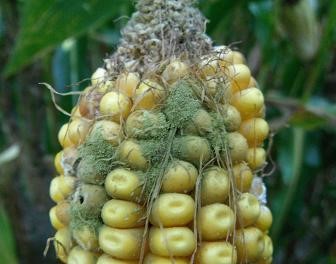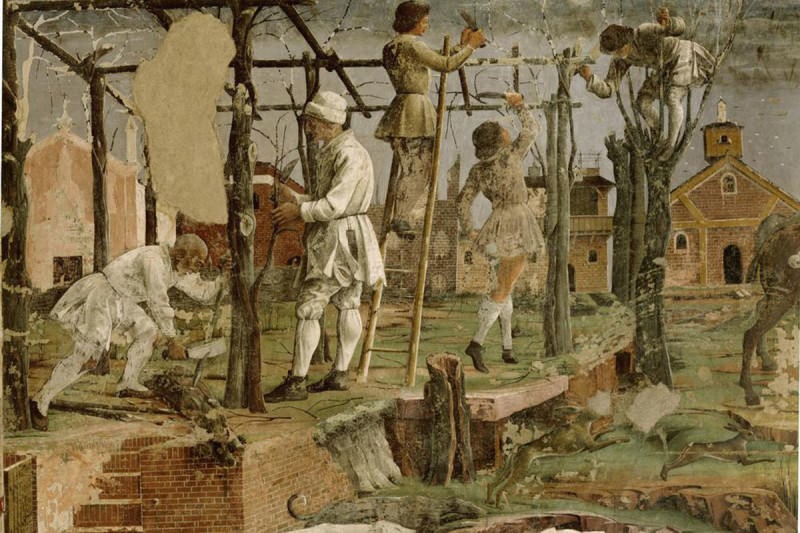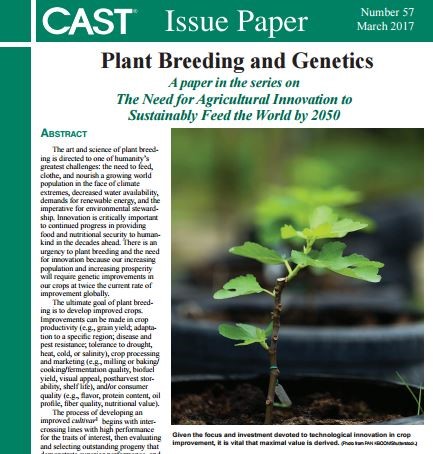Play Ball!: What We’re Reading April 2017
The smell of the popcorn, pretzels, and hot dogs. The crack of the bat hitting the ball. The feel of a freshly oiled glove. The sight and scent of newly cut grass in the outfield. It’s baseball season again, so let’s check out the lineup of stories that were home runs this past month. These articles really hit it out of the park in March, so check out the box score and see what the hot prospects in GMO technology are.
Field of Dreams
 Leading off is a story about a team of scientists developing a new genetically modified corn that could help fight a deadly toxin. This toxin, aflatoxin, is a natural chemical produced by a fungus found in several crops, including corn, wheat, and rice, and is a major risk factor for developing liver cancer. Developing countries don’t have the resources to test for the toxin, or the luxury to just throw away grain from infested crops. A new article in Newsweek, “A Genetically Modified Corn Could Stop A Deadly Fungal Poison—If We Let It,” explains that researchers at the University of Arizona have developed a type of genetically engineered corn that blocks the enzymes needed to create this toxin, making corn safer to eat in countries that already have some strikes against them. Learn more about this hit research at Newsweek.com.
Leading off is a story about a team of scientists developing a new genetically modified corn that could help fight a deadly toxin. This toxin, aflatoxin, is a natural chemical produced by a fungus found in several crops, including corn, wheat, and rice, and is a major risk factor for developing liver cancer. Developing countries don’t have the resources to test for the toxin, or the luxury to just throw away grain from infested crops. A new article in Newsweek, “A Genetically Modified Corn Could Stop A Deadly Fungal Poison—If We Let It,” explains that researchers at the University of Arizona have developed a type of genetically engineered corn that blocks the enzymes needed to create this toxin, making corn safer to eat in countries that already have some strikes against them. Learn more about this hit research at Newsweek.com.
The Natural
Next up is a double header about the history of plant breeding. First is a study in the New Scientist by British researchers who have discovered that we may have been modifying plants accidentally at the genetic level for millennia. We’ve known that farmers have been modifying crops  for thousands of years through selection, but this new study shows that one of the ways farmers have made new plants, grafting (transplanting part of one plant onto another so they fuse and continue to grow), can actually swap DNA between the plants. So in a changeup, genetically modified crops and trees have been around for so long they could use their own 7th inning stretch!
for thousands of years through selection, but this new study shows that one of the ways farmers have made new plants, grafting (transplanting part of one plant onto another so they fuse and continue to grow), can actually swap DNA between the plants. So in a changeup, genetically modified crops and trees have been around for so long they could use their own 7th inning stretch!
The second half of our doubleheader continues the evolution of plant modification theme. An article in The Western Producer features an interview with plant breeder and Cornell University professor Margaret Smith. Dr. Smith notes that we have been modifying crops through domestication, selection, and cross breeding for many years, and genetic modification is only the newest tool available for scientists to use. She believes it’s possible that people who oppose genetic modification do not necessarily know the history of crop modification, and more education about the evolution of plant breeding could help get more people to support GMO technology.
Don’t balk – check out both of these articles here and here.
A League of Their Own
 In Royal news… no, not the Kansas City Royals, but actual royalty… Princess Anne has come out in favor of genetically modified crops. While her brother, Prince Charles, has been vocal in his opposition to the technology, Princess Anne says she sees no problem with them, especially if they can help crops grow. She says that genetically modified crops have real benefits to offer to society, according to BBC News. Her views come from personal experience, as she runs a farm and is very involved in various countryside organizations. In her own double play, she is open to planting GM seeds on her lands, and also is especially interested in GM technology having the ability to improve some of her rare livestock. Batting a thousand, she is certainly one of the most high profile figures to come out in support of GMOs, and her announcement is also notable considering the generally unfavorable views of GMOs in Great Britain and much of the rest of Europe. To learn more about Princess Anne’s perspective, please read “Genetically-modified crops have benefits - Princess Anne” at the BBC News site.
In Royal news… no, not the Kansas City Royals, but actual royalty… Princess Anne has come out in favor of genetically modified crops. While her brother, Prince Charles, has been vocal in his opposition to the technology, Princess Anne says she sees no problem with them, especially if they can help crops grow. She says that genetically modified crops have real benefits to offer to society, according to BBC News. Her views come from personal experience, as she runs a farm and is very involved in various countryside organizations. In her own double play, she is open to planting GM seeds on her lands, and also is especially interested in GM technology having the ability to improve some of her rare livestock. Batting a thousand, she is certainly one of the most high profile figures to come out in support of GMOs, and her announcement is also notable considering the generally unfavorable views of GMOs in Great Britain and much of the rest of Europe. To learn more about Princess Anne’s perspective, please read “Genetically-modified crops have benefits - Princess Anne” at the BBC News site.
Bang the Drum Slowly
 Batting cleanup, the Council for Agricultural Science and Technology (CAST) has issued the first paper in their series on The Need for Agricultural Innovation to Sustainably Feed the World by 2050. The goal of this world series is to make the connection between science and technology with agriculture, with a specific focus on the importance of plant breeding innovation in meeting the challenge of feeding a rapidly growing global population over the next half century. This new paper, Plant Breeding and Genetics, provides an overview of a variety of issues facing agriculture today, including the science of plant breeding and genetics, the need for encouraging the next generation of scientists, the current role of government policy and regulations, and the need for cooperation and collaboration at all levels, including public-private partnerships. Download a copy of the paper today!
Batting cleanup, the Council for Agricultural Science and Technology (CAST) has issued the first paper in their series on The Need for Agricultural Innovation to Sustainably Feed the World by 2050. The goal of this world series is to make the connection between science and technology with agriculture, with a specific focus on the importance of plant breeding innovation in meeting the challenge of feeding a rapidly growing global population over the next half century. This new paper, Plant Breeding and Genetics, provides an overview of a variety of issues facing agriculture today, including the science of plant breeding and genetics, the need for encouraging the next generation of scientists, the current role of government policy and regulations, and the need for cooperation and collaboration at all levels, including public-private partnerships. Download a copy of the paper today!



